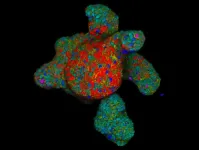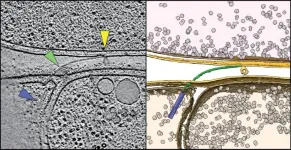(Press-News.org) The health of American democracy is facing challenges, with experts pointing to recent democratic backsliding, deepening partisan divisions, and growing anti-democratic attitudes and rhetoric. In this issue of Science, Research Articles, a Policy Forum, a Science News feature, and a related Editorial highlight how the tools of science and technology are being used to address this growing concern and how the upcoming U.S. presidential election could impact U.S. science.
In one research study in this special issue, Jonathan Chu and colleagues sought to understand whether understandings of democracy differ across societies. They investigated global conceptualizations of democracy by conducting conjoint survey experiments in six countries – the U.S., Italy, Egypt, India, Thailand, and Japan. Chu et al. found that participants consistently identified free and fair elections and the protection of civil liberties as the most essential attributes of a democracy, regardless of whether the country was a well-functioning democracy, backsliding, or non-democratic. Desirable social and economic outcomes were also linked to democracy but, compared to elections and civil liberties, played a smaller role. The findings provide empirical evidence of a universal preference for free and fair elections and civil liberties as the primary markers of democracy, offering a clearer framework for defending democratic norms worldwide.
Also in the special issue, Jan Voelkel and colleagues present a megastudy evaluating 25 interventions designed to reduce partisan animosity and anti-democratic attitudes in the U.S., involving more than 32,000 participants. Rather than expecting single, brief exposures to yield lasting changes, the study aimed to identify which general strategies are effective in influencing partisan and anti-democratic attitudes, thereby enhancing understanding of the key causal forces at play in this space. Voelkel et al. found that many strategies effectively reduced partisan animosity, particularly those emphasizing shared identities or highlighting relatable individuals with opposing political beliefs. Other interventions, like correcting misperceptions of rival partisans' views and emphasizing the risks of democratic collapse, successfully reduced anti-democratic attitudes. However, reducing partisan hostility did not always translate to a reduction in support for anti-democratic practices, indicating that the two issues are distinct. The findings suggest that interventions targeting both partisan animosity and anti-democratic attitudes can be effective and highlight specific strategies that may bolster democratic attitudes in a polarized society.
A summary of a third study in the special issue, led by Michael Tessler and which explores the use of AI to improve democratic deliberation, can be found in a separate SciPak entry.
“The articles by Chu et al., Voelkel et al., and Tessler et al. show that online surveys, experiments, and AI-assisted deliberation can help to improve democratic attitudes and build consensus among the public. We welcome the development and refinement of such tools but also caution against focusing too narrowly on public opinion,” write Brendan Nyhan and Rocío Titiunik in a related Policy Forum. The Policy Forum highlights the strengths and/or limitations of the three studies. “Understanding and preventing democratic erosion requires an equal focus on political institutions, electoral rules, and the behavior of elites, the study of which is less amenable to experimentation and is often based on observational research designs and historical data.”
A feature story in the special issue by Science’s news team compares and contrasts what the science community could expect from a Donald Trump or Kamala Harris administration, examining issues like S&T funding, science integrity, high skills immigration, and science education. In an Editorial, Science Editor-in-Chief Holden Thorp further elaborates on elements in the news feature, including points on which there is agreement in the Trump and Harris camps. “One matter is the US approach to China, a rising research powerhouse,” says Thorp.
Podcast: A segment of Science's weekly podcast with Jonathan Chu, related to this research, will be available on the Science.org podcast landing page after the embargo lifts. Reporters are free to make use of the segments for broadcast purposes and/or quote from them – with appropriate attribution (i.e., cite "Science podcast"). Please note that the file itself should not be posted to any other Web site.
Raw data and replication code for Chu et al. is available here.
END
Special Issue explores factors influencing democratic attitudes, and what’s at stake for science in the U.S. after November election
Summary author: Walter Beckwith
2024-10-17
ELSE PRESS RELEASES FROM THIS DATE:
Extratropical forest fire emissions are increasing as climate changes
2024-10-17
As climate change promotes fire-favorable weather, climate-driven wildfires in extratropical forests have overtaken tropical forests as the leading source of global fire emissions, researchers report. The findings raise urgent concerns about the future of forest carbon sinks under climate change. Fire has long played a role in shaping Earth's forests and regulating carbon storage in ecosystems. However, anthropogenic climate change has intensified fire-prone weather, leading to an increase in burned areas and carbon emissions, particularly in forested regions. These fires not only reduce forests' ability to absorb carbon but also disrupt ecosystems, harm biodiversity, and pose significant ...
A new approach to capturing complex mixtures of organic chemicals in blood, evaluated in pregnant women
2024-10-17
Studies of chemicals in our blood typically capture only a small and unknown fraction of the entire chemical universe. Now, a new approach aims to change that. In a study involving blood samples of pregnant women collected between 2006 and 2008, researchers report having quantified many complex mixtures of chemicals that may pose neurotoxic risks, even when the individual chemicals were present at seemingly harmless levels. “The quantification of 294 to 473 chemicals in plasma is a major improvement compared with the usual targeted analysis focusing on only few selective analytes,” wrote the authors. ...
Gut instincts: Intestinal nutrient sensors
2024-10-17
A multi-institutional group of researchers led by the Hubrecht Institute and Roche’s Institute of Human Biology has developed strategies to identify regulators of intestinal hormone secretion. In response to incoming food, these hormones are secreted by rare hormone producing cells in the gut and play key roles in managing digestion and appetite. The team has developed new tools to identify potential ‘nutrient sensors’ on these hormone producing cells and study their function. This could result in new strategies to interfere with the release of these hormones and provide avenues for the treatment of a variety of metabolic or gut motility disorders. The work will be presented ...
Catching prey with grappling hooks and cannons
2024-10-17
Countless bacteria call the vastness of the oceans home, and they all face the same problem: the nutrients they need to grow and multiply are scarce and unevenly distributed in the waters around them. In some spots they are present in abundance, but in many places they are sorely lacking. This has led a few bacteria to develop into efficient hunters to tap into new sources of sustenance in the form of other microorganisms.
Although this strategy is very successful, researchers have so far found only a few predatory bacterial species. One is the soil bacterium Myxococcus xanthus; ...
Effects of chemical mixtures: Neurotoxic effects add up
2024-10-17
"In our everyday lives, we are exposed to a wide variety of chemicals that are distributed and accumulate in our bodies. These are highly complex mixtures that can affect bodily functions and our health," says Prof Beate Escher, Head of the UFZ Department of Cell Toxicology and Professor at the University of Tübingen. "It is known from environmental and water studies that the effects of chemicals add up when they occur in low concentrations in complex mixtures. Whether this is also the case in the human body has not yet been sufficiently investigated - this is precisely where our study comes in."
The extensive research work was based on over 600 blood samples from ...
Mpox in Africa was neglected during the previous outbreak, and requires urgent action and investment by leaders now to prevent global spread
2024-10-17
Mpox in Africa was neglected during the previous outbreak, and requires urgent action and investment by leaders now to prevent global spread, claim experts from The Independent Panel for Pandemic Preparedness and Response, ex-NZ Prime Minister Helen Clark, former Liberian President and Nobel Peace Prize winner Ellen Johnson Sirleaf, and other global health specialists.
####
Article URL: https://journals.plos.org/globalpublichealth/article?id=10.1371/journal.pgph.0003714
Article Title: Mpox: Neglect has led to a more dangerous virus now spreading across borders, harming and killing people. Leaders must take action to stop mpox now
Author Countries: ...
A new era of treating neurological diseases at the blood-brain-immune interface
2024-10-17
SAN FRANCISCO—The question of what causes complex neurological diseases such as Alzheimer’s or multiple sclerosis continues to confound scientists and doctors, with the unknowns standing in the way of early diagnoses and effective treatments.
Even among identical twins who share the same genetic risk factors, one may develop a particular neurological disease while the other does not.
That’s because unlike diseases such as cystic fibrosis or sickle-cell anemia, which are caused by a single gene, most neurological disorders are associated with many—sometimes hundreds—of rare genetic variants. ...
Astronomers detect ancient lonely quasars with murky origins
2024-10-17
A quasar is the extremely bright core of a galaxy that hosts an active supermassive black hole at its center. As the black hole draws in surrounding gas and dust, it blasts out an enormous amount of energy, making quasars some of the brightest objects in the universe. Quasars have been observed as early as a few hundred million years after the Big Bang, and it’s been a mystery as to how these objects could have grown so bright and massive in such a short amount of cosmic time.
Scientists have proposed that the earliest quasars sprang from overly dense ...
New study highlights the dangers of handheld cellphone use among teen drivers
2024-10-17
PHILADELPHIA (October 17, 2024) – A new study, conducted by a group of researchers led by Penn Nursing and Perelman School of Medicine and funded by the Centers for Disease Control, found a strong association between handheld cellphone use and risky driving behaviors among newly licensed teen drivers. The study, published online first in JAMA Open, used a smartphone telematics application to track the driving habits of hundreds of teens and identify potential safety risks.
The investigation found that teens who used their cellphones while driving were significantly more likely to engage in risky driving behaviors, such as hard braking and rapid acceleration. These behaviors can ...
Part of the GBHSH community in Spain uses doxycycline to prevent sexually transmitted diseases
2024-10-17
The increasing incidence of sexually transmitted bacterial infections (STIs) is a major public health problem worldwide. Currently, among the therapies being studied is the use of the antibiotic doxycycline as a method of post-exposure prophylaxis after unprotected sex — known as DoxyPEP. Now, the University of Barcelona and the NGO Stop have carried out the first study in Spain on the use of DoxyPEP as a preventive strategy among the gay, bisexual and other men who have sex with men (GBHSH) community in Spain.
“The results suggest that, although medical and scientific associations rarely endorse the community use of DoxyPEP as a prevention strategy, ...
LAST 30 PRESS RELEASES:
Striking genomic architecture discovered in embryonic reproductive cells before they start developing into sperm and eggs
Screening improves early detection of colorectal cancer
New data on spontaneous coronary artery dissection (SCAD) – a common cause of heart attacks in younger women
How root growth is stimulated by nitrate: Researchers decipher signalling chain
Scientists reveal our best- and worst-case scenarios for a warming Antarctica
Cleaner fish show intelligence typical of mammals
AABNet and partners launch landmark guide on the conservation of African livestock genetic resources and sustainable breeding strategies
Produce hydrogen and oxygen simultaneously from a single atom! Achieve carbon neutrality with an 'All-in-one' single-atom water electrolysis catalyst
Sleep loss linked to higher atrial fibrillation risk in working-age adults
Visible light-driven deracemization of α-aryl ketones synergistically catalyzed by thiophenols and chiral phosphoric acid
Most AI bots lack basic safety disclosures, study finds
How competitive gaming on discord fosters social connections
CU Anschutz School of Medicine receives best ranking in NIH funding in 20 years
Mayo Clinic opens patient information office in Cayman Islands
Phonon lasers unlock ultrabroadband acoustic frequency combs
Babies with an increased likelihood of autism may struggle to settle into deep, restorative sleep, according to a new study from the University of East Anglia.
National Reactor Innovation Center opens Molten Salt Thermophysical Examination Capability at INL
International Progressive MS Alliance awards €6.9 million to three studies researching therapies to address common symptoms of progressive MS
Can your soil’s color predict its health?
Biochar nanomaterials could transform medicine, energy, and climate solutions
Turning waste into power: scientists convert discarded phone batteries and industrial lignin into high-performance sodium battery materials
PhD student maps mysterious upper atmosphere of Uranus for the first time
Idaho National Laboratory to accelerate nuclear energy deployment with NVIDIA AI through the Genesis Mission
Blood test could help guide treatment decisions in germ cell tumors
New ‘scimitar-crested’ Spinosaurus species discovered in the central Sahara
“Cyborg” pancreatic organoids can monitor the maturation of islet cells
Technique to extract concepts from AI models can help steer and monitor model outputs
Study clarifies the cancer genome in domestic cats
Crested Spinosaurus fossil was aquatic, but lived 1,000 kilometers from the Tethys Sea
MULTI-evolve: Rapid evolution of complex multi-mutant proteins
[Press-News.org] Special Issue explores factors influencing democratic attitudes, and what’s at stake for science in the U.S. after November electionSummary author: Walter Beckwith






